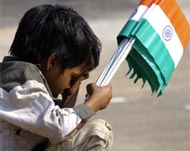Shootings mar India’s Republic Day
Indian soldiers have shot dead 10 villagers in the volatile northeast, while separatists set off three bombs during Republic Day celebrations in the region.

On Wednesday the soldiers fired on a crowd of about 5000 people that attacked them with knives, sticks and stones.
“They thought militants were in the crowd, but finally when local police identified the bodies, they turned out to be local villagers. There were no militants among the victims,” said police inspector-general Khagen Sharma.
The attacks happened in the village of Hajo on the outskirts of Guwahati, the region’s main city, where troops went to hunt separatists believed to be hiding there.
Hundreds of policemen have since been sent to the village to prevent a fresh outbreak of violence, another police officer said.
Parade bombing
In Guwahati itself, suspected members of the outlawed United Liberation Front of Asom set off two bombs at a heavily guarded parade ground during Republic Day celebrations, but no one was wounded in the blasts.
 |
|
India is marking Republic Day |
The bombs exploded in quick succession on a deserted stretch of the ground where Assam state’s governor, chief minister and other officials had gathered for ceremonies.
“There was nobody there, that part of the ground was off-bounds. There are no casualties,” a police officer said.
Another bomb went off in a drain in Bongaigaon town, 150km west of Guwahati, but again no one was hurt.
Police blamed the attacks on the United Liberation Front of Asom, which had called for a boycott of Republic Day celebrations in the oil and tea-rich state of Assam.
The group is fighting for independence, accusing the federal government of plundering the state’s resources and neglecting the welfare of the locals.
Black smoke
India is marking its Republic Day with military parades, flag-hoisting ceremonies and cultural shows across the country.
|
“The insurgents have in desperation resorted to sporadic attacks on soft targets” Ajai Singh, Assam’s governor |
The first Guwahati explosion took place when a bomb, hidden in a drain in a far corner of the parade ground, exploded moments after a convoy carrying Assam Chief Minister Tarun Gogoi arrived.
Fifteen minutes later, a second bomb detonated inside the ground just as Assam‘s governor, Ajai Singh, was inspecting a military guard of honour.
There was black smoke and a lot of dust, as a dance troupe ran in different directions in panic.
But officials went ahead with the flag hoisting and parade ceremonies, despite the blasts.
“The insurgents have in desperation resorted to sporadic attacks on soft targets,” Singh said in a speech at the celebrations.
Black day
The authorities boosted security in Indian Kashmir where separatists have called for a general strike to mark 26 January as a “black day”.
|
“Kashmiris are against occupation and will continue to resist it” Hurriyat, separatist alliance |
Soldiers in battle gear patrolled the streets of Srinagar, the summer capital of the disputed state.
Jammu and Kashmir is India’s only Muslim-majority state, and a 15-year separatist rebellion against New Delhi‘s rule there has killed more than 45,000 people.
“We appeal to people to observe 26 January as a black day and convey it to the international community that Kashmiris are against occupation and will continue to resist it,” a statement from the moderate faction of the region’s main separatist alliance, Hurriyat, said.